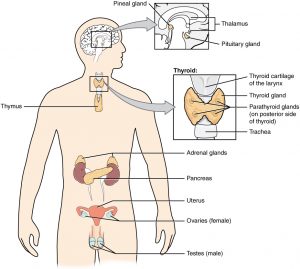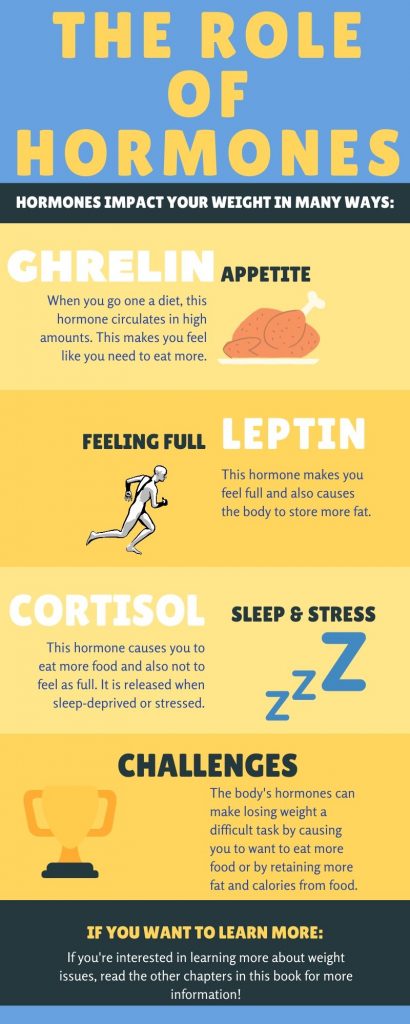4 The Role Of Hormones
Brandon Perdue
The Endocrine System
Hormones are chemicals that are naturally produced in the body and function as chemical messengers to control different processes within the body. One of their many roles is to control the body’s regulation of weight. The release of hormones is controlled by the endocrine system. The endocrine system is a network of innervated glands that can release various hormones to cause changes throughout the body.
The Organs of the Endocrine System

To control weight, this system of glands releases hormones that can alter a person’s metabolic rate, cause the storage of fat, or cause a person to change their intake of food, among other things. Hormones are similar to nerve impulses, they cause parts of your body to respond when they are activated; however, hormones typically take longer to have an effect and their effects typically last much longer than actions from the nervous system in the body (Marieb & Hoehn, 2019).
Hormones of Interest
Of the many hormones circulating through the body, there are a few that are important to know when discussing weight regulation: ghrelin, cortisol, insulin, and leptin. Ghrelin controls a person’s feeling of hunger, while leptin controls a person’s feeling of being full. Cortisol is released when the body is placed under stress and causes a person’s body to store more calories as fat as well as changing a person’s metabolism. Insulin is another hormone that affects weight regulation by allowing the body to convert carbohydrates into energy. Leptin is the final hormone covered in this chapter and serves to help regulate appetite and metabolism. High levels of leptin cause the body to store more energy as fat, as well as reduce the rate of metabolism. Chronically high levels of leptin (such as from overeating) can cause leptin resistance. This condition causes the body to not respond as well to leptin, and therefore not feel full even when the person does not need to eat any more food.
Diet and Hormones
A person’s diet influences the release of hormones in their body. This is especially important when a person is attempting to restrict their calorie intake. A study by Sumithran et al. (2011), Long-Term Persistence of Hormonal Adaptations to Weight Loss, looked at the effects of diet on the long-term levels of hormones circulating in the body. The participants were enrolled in a 10-week weight loss-oriented diet, during which they consumed what the study designers deemed a very low energy diet.
It was found that ghrelin levels, the hunger hormone, were significantly higher during the time after eating a meal after the diet than before 10 weeks after the original program concluded. This change was still found to be significant, although levels were lower, 62 weeks after the original program concluded. This change is what contributes to a person feeling hungry after they are on a diet. Their body is used to a larger number of calories and will try to get them to eat more during the day to make up for the perceived lack of calories. This study also found that after a person has ended a diet, the leptin levels in their body remain significantly lower than the levels before the diet began. This causes the person to feel as though they need to eat more food because they do not feel “full” since the leptin levels are lower than the body is used to.
Insulin levels were also found to be much lower after the end of the diet, for up to 62 weeks after the diet concluded than they were at the start of the diet. Lower levels of insulin in the body will cause the person to feel as though their hunger is unsatisfied when they eat. This leads the person to eating more than necessary because their body does not use all of the carbohydrates obtained from the food.
Sleep, Hormones, and Weight
A person’s lifestyle choices affect their weight in several ways. Some of these ways are direct, for example: if a person chooses to not exercise or to eat an unhealthy diet it will directly affect their health and weight. There are also indirect methods: some lifestyle choices affect the body’s hormone levels. Factors such as the amount of sleep can affect how the body releases hormones.
It has been noted that the amount of sleep a person regularly gets is related to their body mass index (BMI). A person’s metabolism, hormones, and natural circadian rhythms are all linked together and therefore when one is disturbed, it can affect the others. There are studies that show changes in leptin, ghrelin, cortisol, and insulin are affected by a lack of sleep. These hormones, as discussed previously, all play a part in regulating a person’s appetite.
Leptin should peak at certain points of the day, indicating that the body does not need to eat, and should be lower around mealtimes, so the body feels the desire to eat. In chronically sleep-deprived people, leptin levels remain low throughout the day. This causes a person to not feel full, which often leads to that person eating more than necessary.
In studies with chronically sleep-deprived people, it was also realized that ghrelin levels, which should fluctuate throughout the day, may not fluctuate properly if a normal sleep pattern is not maintained. This leads to an increase in appetite, again causing the person to eat more than is needed.
Cortisol levels in chronically sleep-deprived people are impacted as well. Cortisol levels impact food intake both directly and indirectly. Directly, cortisol increases food consumption itself. Indirectly, high cortisol levels affect the release of leptin which affects the body’s metabolism as well as appetite. High cortisol levels cause the production of leptin to slow down. This results in an increased appetite because leptin is not released in high enough amounts to satisfy the hunger a person feels (Schwarz et al., 2011). For more information about the effects of cortisol, refer to the Stress and Obesity chapter.
Summary
Hormones complicate the process of dieting, especially after someone reaches their target weight and stops dieting. Some play a large role in the rate of individuals relapsing after they have lost weight. Once these challenges are understood, they can be expected and planned for. If individuals know what is happening in their body that causes them to gain back weight or relapse into general unhealthy eating habits, it is easier to understand when struggling with weight after dieting. Hormones can affect weight problems long after the weight has initially been lost. Everyone is affected in some way and those who struggle with weight gain suffer similar challenges.
When working on losing weight after a period of being overweight or obese, it is important to remember that it will be a process to retrain the body after losing weight. The body does not like sudden changes and will use what it can to prevent changes from occurring, in this case using hormones that can ultimately cause losing weight to be difficult. It is also important to understand that hormones circulating throughout the body can have many effects on weight loss and weight gain, causing weight changes to be more complex than simple calories-in/calories-burnt calculations. Here is a graphic on the summary of each hormone.

Review Questions
1. What effect does leptin have on the body?
a. It causes the body to feel full
b. It causes the intestines to not absorb as many calories
c. It causes the stomach to allow food through faster, thereby making it less digestible
d. It increases the absorption of calories
2. Dieting increases insulin levels.
a. True
b. False
3. How does cortisol affect food intake?
a. Increases food intake
b. Decreases food intake
c. Increases fat storage from food
d. Increases metabolism rate
References
Marieb, E. N., & Hoehn, K. (2019). Human anatomy & physiology. Pearson Education Limited.
Schwarz, N. A., Rigby, B. R., Bounty, P. L., Shelmadine, B., & Bowden, R. G. (2011). A Review of Weight Control Strategies and Their Effects on the Regulation of Hormonal Balance. Journal of Nutrition and Metabolism, 2011, 1–15. doi: 10.1155/2011/237932
Sumithran, P., Prendergast, L., Delbridge, E., Purcell, K., Shulkes, A., & Proietto, J. (2011). Long-term persistence of hormonal adaptations to weight loss. Obesity Research & Clinical Practice, 5, 1597–1604. doi: 10.1016/j.orcp.2011.08.082
The glands and parts of glands that produce endocrine secretions, help to integrate and control bodily metabolic activity, and include especially the pituitary, thyroid, parathyroids, adrenals, islets of Langerhans, ovaries, and testes
The chemical changes in living cells by which energy is provided for vital processes and activities and new material is assimilated.
continuing or occurring again and again for a long time
Being, having, characterized by, or occurring in approximately 24-hour periods or cycles (as of biological activity or function)
To shift back and forth uncertainly

